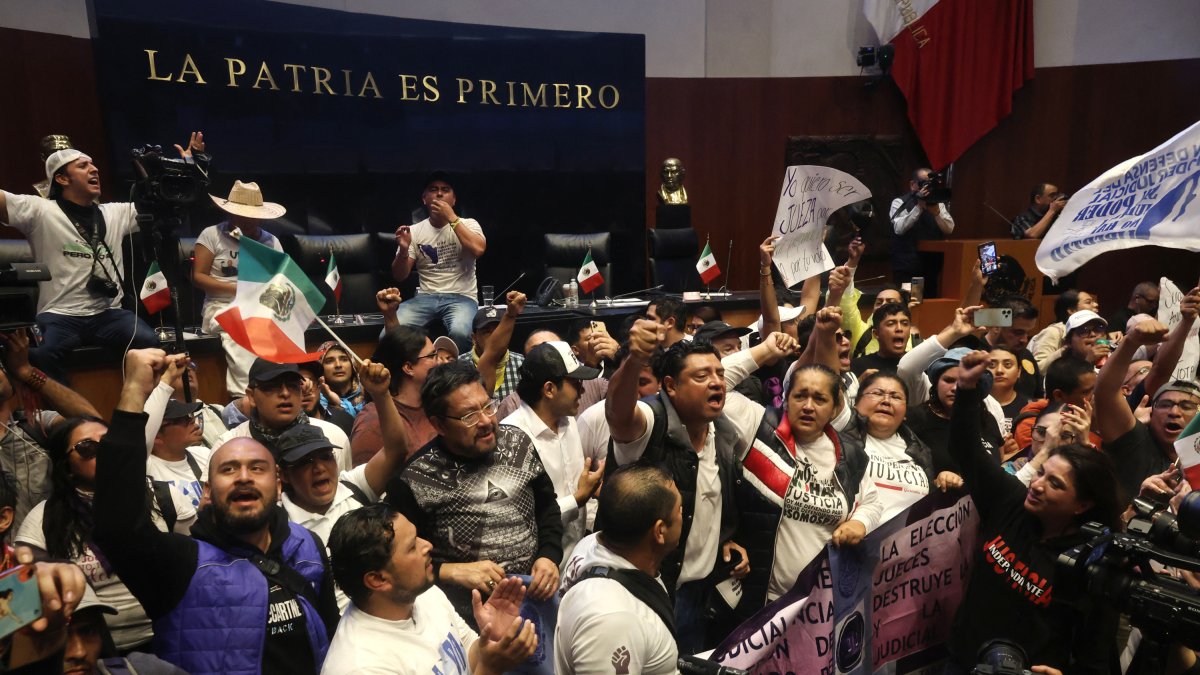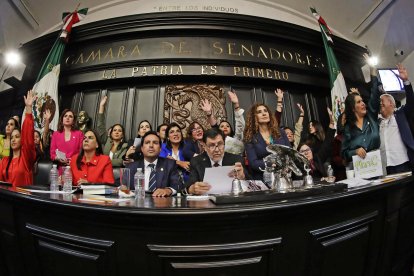Extortion and mafia practices: how the separation of powers died in Mexico
The ruling party managed to approve a controversial judicial reform by extorting opponents in a process rejected by a broad sector of Mexican society.

Protesters take over the Senate in Mexico
In recent years, the American continent has witnessed how the three most influential countries in the region have had their Congress taken over by protesters: United States in 2021, Brazil in 2023 and Mexico in 2024. In the first two, the motives were electoral and both events were categorically rejected by the international community. However, in Mexico, the situation is completely different with a popular outburst that responds to a genuine concern: the end of the separation of powers in Mexico.
Why is the reform so controversial and how is it already affecting Mexico?
On Tuesday, September 10, the Mexican Senate became a battleground. Protesters -most of them judicial branch workers, law students from different universities and academics who recognize the risks posed by the reform's approval-, took over the Upper House for several hours while the ruling party, led by the outgoing president, Andrés Manuel López Obrador (AMLO), finished approving a controversial judicial reform repudiated by an important sector of Mexican society.
The demonstrators, while shouting "traitors," forced José Gerardo Fernández, president of the Senate, to temporarily suspend the session. But the effort was in vain. Later, in the early hours of Wednesday morning, the reform was approved with 86 votes in favor, equivalent to two-thirds of the 127 senators present. It garnered only 41 votes against from opposition parties, which saw some defectors contribute to the formal approval.
AMLO's judicial reform generates abrupt changes and an absolute reconstruction of the Mexican judiciary. First, it looks forward to the total renewal of the Supreme Court of Justice in 2025, as well as half of the circuit magistrates and judges. The bill also seeks to reduce the number of Supreme Court justices from 11 to 9, and to reduce their term from 15 to 12 years. However, the most important reform, which generates most of the criticism, is the election of ministers, magistrates and judges through popular vote; a form of election that is replicated in only a few countries in the world, such as Bolivia and the United States.

Massive protests in Mexico against AMLO's judicial reform.
The difference with Mexico is that the election of judges will not be like in Bolivia and the United States, since the nomination of magistrates will be at the discretion of the Executive, that is, in the hands of the incoming president Claudia Sheinbaum (AMLO's token) and the Congress, where the ruling party has an absolute majority. This could leave the three branches of the Mexican State under the same partisan group.
In addition, Mexico will be the only country on the planet where all judges and magistrates, who in total represent some 6,500 authorities, will be elected by popular vote.
The most serious aspect, according to experts, is that AMLO's reform considerably reduces the requirements to become a Supreme Court justice. One of the great critics of the reform is Norma Piña, the president and one of the 11 Supreme Court justices, who, despite considering herself progressive, agrees with the Mexican opposition that the reform is a direct attack on the separation of powers.
"The system that is established for the election of judges, because it implies that in order to be a judge no preparation is required, but only to be a lawyer; there is no preparation, there is no collegiality, and they are going to be elected by popular vote after entering a tombola. In other words, they will get a piece of paper. It will be luck to be a federal judge or magistrate in Mexico," Piña explained in an interview for the BBC weeks before the reform was approved in the Senate.
At the time, Piña said that Mexico's future depended on the reform not prospering.

World
Mexico finally approves its controversial judicial reform that attacks separation of powers
Juan Carlos Téllez
According to the reform, in order to be elected as a Supreme Court justice, applicants will in effect only need to have a professional law degree with a minimum grade point average of 8.0 and a 9.0 in subjects related to the position for which they are running. In addition, they will only need five years of professional experience in the practice of law.
The context in which the reform is passed is also not the best in institutional terms, since AMLO's direct attack on the judiciary comes when the President and the Supreme Court have clashed on several occasions, being the only power that has blocked, among other things, laws that expanded the State's participation in the energy sector and left citizen security in the hands of the military.
The reform, which has just been approved this Wednesday, September 11, is already hurting Mexico in diplomatic and economic terms.
The most worrisome case is AMLO's willingness to temporarily suspend relations with the U.S. ambassador to Mexico, Ken Salazar, who harshly criticized the reform in X.
In particular, the U.S. ambassador lashed out that AMLO's proposed reform could "make it easier for cartels and other malign actors to take advantage of inexperienced, politically motivated judges," generating economic and political "turbulence" for years to come in the neighboring country.
Salazar's prediction, in fact, is already unfolding. The reform has generated protests, a judicial strike and the devaluation of the Mexican peso, a logical step due to the fear of investors who no longer trust Mexico's legal security.
The controversial approval of the ruling party and some "traitors"
Alice Galvan, the president and founder of Fundación Patria Unida, an independent and non-partisan organization, explained to VOZ that the judicial reform was approved in the midst of extortion practices; since in the Senate the margin for the ruling party, despite its majority, was short.
Faced with the situation, the ruling party acted against some of the "dissidents" who only needed the right "incentives" to vote in favor of the reform: threats against their relatives, themselves and also benefits that go against Mexico's interests.
According to Galvan, as the ruling party still needed a couple of votes, "they extorted two senators, one from Movimiento Ciudadano and one from PAN, with arrest warrants against them and against their family so that they would betray and vote in favor of the reform of the Judicial Power."
This is the reason for the takeover of the Senate, said Galvan, who described the break-in as an "unprecedented" event in Mexico's democratic history.
"Yesterday, in an unprecedented event, there was an awakening of the citizenship by the hand of many of these students and workers of the Judiciary who took over the Senate facilities to ask Morena for an open parliament where the real reform that the Mexican judiciary requires would be debated with experts," said the founder of Patria Unida.

Members of Mexico's Senate celebrate after approving controversial judicial reform.
Carlos Loret de Mola, one of the country's most renowned Mexican journalists, denounced the extortions applied by the ruling party against dissident senators.
Specifically, Loret de Mola explained the case of PAN senator Miguel Ángel Yunes, who joined the ruling party's bench to vote in favor of the judicial reform.
"The PAN senator Miguel Ángel Yunes Márquez asked for a leave of absence because he is sick with a spine ailment and left everything in the hands of his father, Miguel Ángel Yunes Linares, whom President López Obrador and Morenistas have put a thousand times as an example of the mafia in power, as an example of the most rotten of the Mexican political system," said Loret, before explaining that the ruling party managed to buy one of the most discredited families in Mexico, the Yunes family.
Actuando como cártel de la mafia, Morena logró aprobar la reforma judicial.
— Carlos Loret de Mola (@CarlosLoret) September 11, 2024
Es el fin de la República.#Loret en @latinus_us: pic.twitter.com/6vq7KHJB4t
"After hiding for days, Miguel Angel Yunes entered the Senate Chamber with a monarch's step, the Morenistas gave him the treatment of a king, some even applauded him standing, the Morena coordinator in the Senate Adán Augusto López stood up from his seat to receive him in the hallway with a hug while the opposition shouted traitor, Morena on its knees before Yunes, revering him. He was the thief, the murderer, the pedophile," stated the Mexican journalist, recalling that, on repeated occasions, AMLO accused Yunes of being a mafia and corrupt politician.
However, despite AMLO's accusations against Yunes, according to Loret de Mola the pact came about because the ruling party proposed to the "opposition" senator that he forget about all the charges against him and the arrest warrants against his children if he voted in favor of the reform.
"He even sat as part of the Morena bench, the extortion worked, and the PAN, responsible for Yunes being senator, responsible for having put characters like Yunes, out of his mind, on the list of candidates," said the journalist, who then spoke of another case,that of senator Daniel Barreda of Movimiento Ciudadano (MC).
In particular, the journalist said that the practices of officialdom to extort Barreda were worthy of Mexican drug cartels.
"Today, on the key day, early this morning, they detained the senator's father in Campeche, governed by the Morenista Layda Sansores, and that prevented Senator Barreda from arriving to the session, they detained his father today and the senator is with him, in the oral trial room in Campeche, is that why 36 million people voted?", asked the journalist, leaving clear evidence how the separation of powers died in Mexico on September 11, 2024.
AMLO boasts with the signing of the law
With all this tension and controversy surrounding him, the Mexican president, Andrés Manuel López Obrador, opted for a staged event to celebrate the approval of his legal reform. The socialist leader uploaded a video to his social networks, accompanied by Sheinbaum, in which he signed the law and thus completed the entire legislative cycle to give it effect.




























